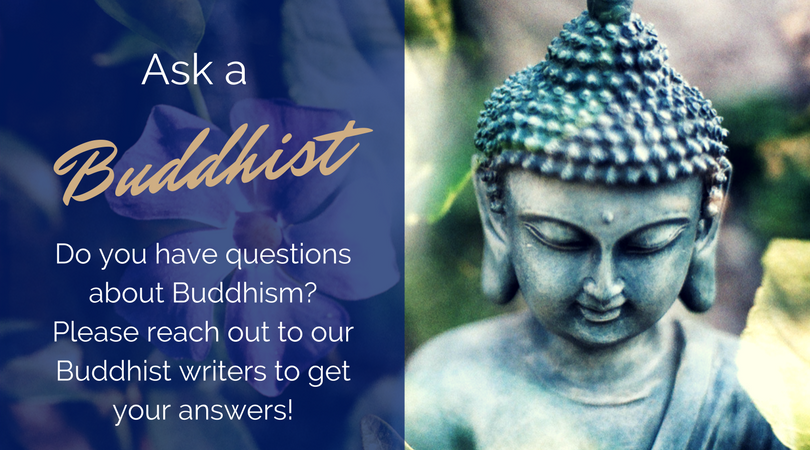What do you want to ask a Buddhist? Fill out the form below or submit your question online.
If you did something wrong before, if you pray to the Buddha will he forgive us?
Yes, he will, so you don’t need to worry about that. According to the Buddhist teachings, the Buddha always forgives us, no matter what we do. We don’t even have to ask for his forgiveness because forgiving is in his nature. The dictionary says that “to forgive” means to “stop feeling angry or resentful towards (someone) for an offense, flaw, or mistake.” The Buddha has completely overcome all feelings of anger and resentment, so he never gets mad at anyone, even for a moment. When someone does something wrong — even towards the Buddha himself, like insulting or hitting him — the Buddha immediately feels only compassion, kindness, and forgiveness towards this person, and wants to do whatever he can to help them. Therefore, you don’t even have to pray to the Buddha and ask forgiveness for some wrong you have done, because the Buddha will automatically forgive you.
Asking for Forgiveness
Nevertheless, it is still good to apologize and ask for forgiveness, both to the Buddha and to anyone you may have harmed or offended. This shows that you acknowledge you have done something wrong (instead of denying it, trying to hide it, or blaming it on someone else), and also that you feel sorry for doing it (instead of being proud of yourself and boasting about it). How can you apologize to the Buddha? A simple way would be to look at an image of the Buddha, or just imagine the Buddha in your mind, and sincerely, from your heart, express your regret for the harmful actions you have done. Imagine the Buddha smiling compassionately at you and accepting your apology. It’s also good to imagine light flowing from the Buddha into you, filling your body and mind completely and clearing away all that negativity.
If you would like to do it in a more extensive way, you could try the practice of purification we do in the Tibetan Buddhist tradition. This is done in front of an image of the Buddha, real or visualized, and involves four steps, sometimes called the “four Rs.”
The Four Rs:
- Regret – openly and honestly declaring the wrongs we have done with sincere regret. Regret is not the same as guilt, which usually involves unhealthy shame and even self-loathing. Instead, it is an intelligent recognition that we did something wrong, along with the courage to admit it and the confidence that we can change.
- Reliance – renewing our commitment to act with kindness and wisdom. Here, Buddhists also renew their commitment to follow the Buddha’s teachings, and those who practice other religions can make a similar re-commitment to what they believe is right.
- Remedy – this means doing something positive to counteract the mistake we made. This involves doing anything that is positive or virtuous, such as reciting prayers or mantras, doing volunteer work, giving a donation to charity, and so forth.
- Resolution – making a promise to not repeat that action, to the best of our ability. Here we need to be realistic, and not make a promise we cannot keep! For example, if we don’t think we can completely stop doing the action, we can promise to avoid it for a certain period of time, such as five minutes, one hour, or one day. Gradually we can increase the amount of time, and eventually we will be able to stop completely.
It is said that there is no deed so bad that it can’t be purified by following these four steps. There are stories in the Buddhist tradition of people who committed multiple murders, but were able to purify that negative karma and totally transform themselves, even becoming saints!
Forgiving Yourself
But often the challenge is to forgive ourselves. Many of us—especially in western countries—feel self-critical and even hating ourselves for our mistakes and wrong actions. Our family and friends, and even strangers, might forgive us for our mistakes, but we may hang on to feelings of guilt, shame, and self-loathing. I think the problem has to do with our self-image; we tend to identify with our mistakes, thinking: “I am a bad person because I did those bad things. That’s who I am and I will always be like that; I can’t change.” We probably don’t do this consciously or deliberately; it’s more of an unconscious mental habit.
So it’s good to be aware if you have such thoughts or attitudes, and if so, understand that they are not true, and are harmful rather than helpful. They just make you feel bad about yourself, ashamed and fearful when you are with others, and do not bring any constructive changes. Remind yourself that you are much more than your mistakes: you have many good qualities and have done many positive things. Understand that your faults and mistakes are not permanent, but changeable. And if the Buddha, God, and other people can forgive you, you can also learn to forgive yourself!






